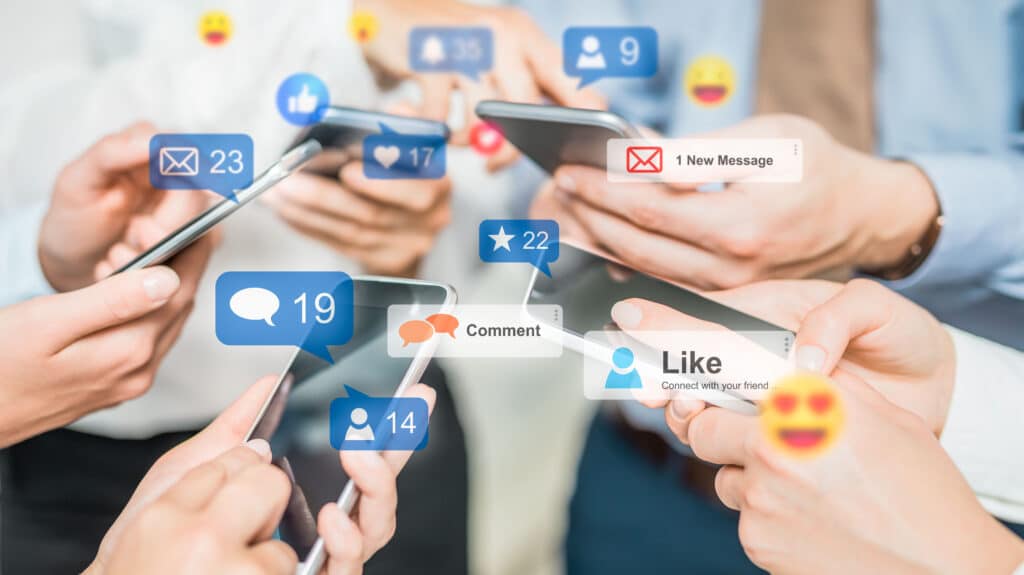Adolescents and young adults are highly social creatures who pay close attention to their peers and use them as reference points for their own style and behavior.
As a result, social media can play an outsized role in the relationship between teenagers and drug and alcohol abuse, which may develop into a substance use disorder when left unchecked.
While excessive social media use has been strongly linked with increases in serious mental health problems, the relationship between social media consumption and substance abuse is less clear. Here’s what we know.
Social Media Facts & Figures
Young people in America today have never lived in a world without the internet and the widespread adoption of social media platforms ranging from Facebook to Twitter, Reddit, Instagram, Snapchat, TikTok, and many others.
According to figures provided by Pew Research, in 2022:
- 97% of teens reported using the internet daily
- 72% of U.S. teens reported access to a smartphone, a computer and a gaming console at home
- 52% of 15- to 17-year-olds reported that they use the internet “almost constantly”
- 36% of 13- to 14-year-olds reported the same perception
- 55% of teens say that spend the right amount of time on social media, compared to 36% who say they spend too much time on social media
- the most popular social media sites for American teens were YouTube (95% use), TikTok (67%), Instagram (62%), Snapchat (59%), Facebook (32%), Twitter (23%), Twitch (20%), WhatsApp (17%), and Reddit (14%)
Social Media & Teen Drug Use
Celebrity, corporate, and peer influence, all transmitted through social media, may plant suggestions or make certain teens anxious about missing out on new experiences like partying and getting high (FOMO).
After all, American teens are consumers of social media, are early adopters when it comes to new technology and behavior, and are highly susceptible to peer pressure.
This could, potentially, lead to increased alcohol and drug use among impressionable teens who consume social media.
What’s The Evidence?
There is some limited evidence to support this concept.
A 2011 study by the National Center on Addiction and Substance Abuse at Columbia University demonstrated that, among the 2,000 studied teens, those who used social media heavily used more tobacco, alcohol, and marijuana than those who didn’t, especially if they had seen pictures of teens using or passed out from alcohol or drugs.
In fact, these teens were:
- 5x more likely to buy cigarettes
- 3x more likely to drink
- 2x more likely to use cannabis
However, in the years since this study the national picture of teen substance use has actually changed for the better.
Millennial & Gen-Z Substance Abuse Trends
Public health statistics from the past two decades (coinciding with the rise of social media) reveal that underage alcohol use among those 17-12 years of age has declined by around 60%.
Teen smoking, also declining for decades, also experienced its fastest ever rate of contraction during this time, electronic cigarettes/vaping notwithstanding.
Likewise, cannabis use among teens has remained relatively steady, while overall illicit drug use appears to have declined also, particularly following the covid-19 pandemic.
Nevertheless, overdose deaths among those 15-24 years of age have increased sharply since the turn of the millennium, reflecting the increased potency of drugs like methamphetamine and fentanyl currently circulating among Americans of all ages.
The Impact Of Social Media On Teen Health
Using social networking sites does not appear to automatically or universally encourage teen alcohol or drug use.
In fact, the use of social media may even cause many young people to reject substance use due to the transmission of positive messaging or association with drug-free peers and role models.
Nevertheless, the influence of social media is not necessarily positive.
Worse Mental Health
Strong evidence even suggests that excessive social media users tend to also develop lower self-esteem, life satisfaction, and mental stability, with increased suicidal thoughts or activity.
Social media use can, in many cases, lead to social comparisons between teens and glamorous influences or their peers constantly showing their best sides.
This constant doubt can chip away at a teen’s happiness and self-image, getting in the way of positive social interactions and generating profound loneliness and dissatisfaction during a vulnerable and formative period.
It remains to be seen if these negative patterns may, in the future, be associated with changes in the use of alcohol and drugs by these generations in the same way that teen suicides have increased substantially since the year 2000.
Getting Help For Your At-Risk Teen
Alcohol and drug addiction can impact anyone, no matter their age or the hashtags they post. And if your teen or some other loved one in your life is struggling with substance abuse, professional treatment can help.
At Northeast Addictions Treatment Center, we provide leading teen and adult outpatient treatment services for all forms of substance abuse including alcohol, prescription drugs, and illicit substances.
We also offer dual diagnosis treatment options for co-occurring mental health disorders like anxiety, depression, manic-depressive disorder, ADHD, and others.
To learn more about your teen’s options for recovery, please reach out to our team today.
Keep Reading:
- What Does The Fire Emoji Mean?
- The Decriminalization Of Drugs | Here Are The Pros & Cons
- The Effects Of Meth On Children In Massachusetts
Sources:
- American Academy of Pediatrics – Digital Media and Risks for Adolescent Substance Abuse and Problematic Gambling
- Journal of Adolescent Health – Social Media and Substance Use: What Should We Be Recommending to Teens and Their Parents?
- National Center for Drug Abuse Statistics (NCDAS) – Teenage Drug Use Statistics [2023]: Data & Trends on Abuse
- Pew Research Center – Teens, Social Media and Technology 2022

